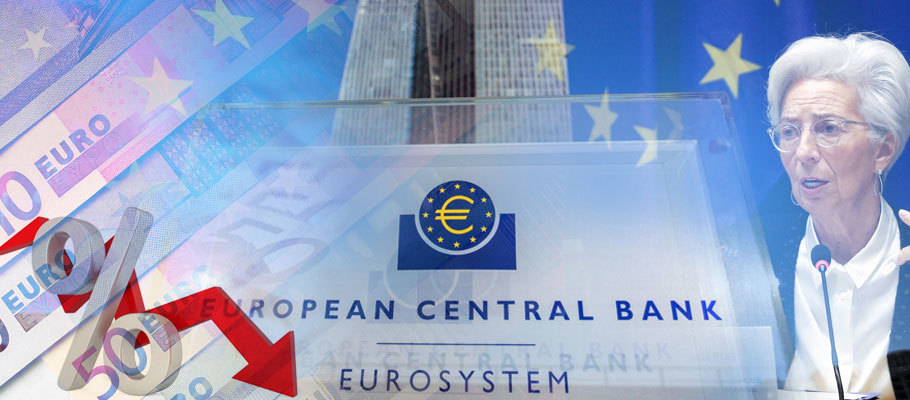
Published: July 16th, 2021
The ECB’s revised inflation strategy could extend the already protracted period of low interest rates and quantitative easing (QE). Frankfurt seems to be taking its lead from the US Federal Reserve (Fed), though some analysts believe the central bank’s new attitude reflects lessons learned from the past policy mistakes.
Europe’s central bankers have voted to raise their inflation target from the ambiguously-worded ‘under but close to 2 per cent and peg it at ‘exactly’ two per cent after completing the first comprehensive overhaul of Eurozone monetary strategy since 2003, which happened shortly after the Euro’s original launch.
While a minor tweak to wording and a difference of a few basis points might seem insignificant when an inflation target is being discussed, the implications of this week’s bank announcement herald a change that financial markets in the Eurozone and beyond may have to reckon with for years to come.
Currency analysts at JP Morgan told Bloomberg this week that the forex market’s big differentiator ‘will be the underlying level of relative growth, where the US still substantially leads, plus any given market's historical success in creating inflation.
The bank says those two factors will determine how rapidly central banks move toward normalisation, not quarter-to-quarter volatility.
Monetary policymakers are charged with managing inflation pressures. In normal times, central banks typically look to raise inflation when they reduce interest rates or strengthen other policies to support macroeconomic growth. The reverse is also true.
In the Eurozone, inflation rates have been stuck below even the ECB’s modest targets levels since the Eurozone debt crisis that cascaded from the global financial crisis of 2008. That’s in sharp contrast to the outcomes achieved in the US, UK, and other countries.
In those countries, central bankers had to manage generally lower inflation levels amid a global trend toward disinflation, the roots of which are still being debated in economic and financial policymaking circles.
The situation has led to a 10-year period where Eurozone interest rates have been incrementally reduced, even dipping below zero at one point, and saw Frankfurt fire up the money printers on a scale few other central banks have had to resort to.
But with the bank now targeting an even higher level of inflation, and even more prolonged period of low interest rates is likely in the offing, alongside more quantitative easing.
Economists at Berenberg in Frankfurt said in a note to investors that the ECB does not seem to be aiming explicitly at an overshoot, ‘but is signalling a stronger tolerance of temporary overshoot’ than investors had expected.
ECB head Christine Lagarde noted on Thursday that the ECB will always ‘assess proportionality before it acts on a policy decision'. That's being interpreted by markets as a signal that the bank will now view its targets in a symmetric manner, e.g. explicitly looking for a rationale that tolerates an elevation of real levels of inflation in the Eurozone economy before it takes action on interest rates.
A subtle change, but in the world’s largest regional economic bloc, also significant. It could prolong further the period of ECB economic support through government bond purchases carried out under its QE programme.
Showing more tolerance for inflation exceeding targets means the ECB’s revised strategy has similar implications to the approach taken last year by the US Federal Reserve. There are some differences, but Frankfurt’s new attitude could easily be interpreted as a direct response to the path already set by its senior central bank cousin.
ECB President Lagarde was quick to dispel any speculation that the bank was simply copycatting Washington policy, however. In a press conference on Thursday, she clarified precisely why the bank would be willing to live with higher inflation in the future.
‘Given the effective lower bound that constitutes a constraint on our actions, we also have to acknowledge that some special action may well be required in order to restore the symmetry,’ she said in a statement.
In that regard, we accept that there may be a need for particularly forceful or tenacious action on the part of the European Central Bank in the event of unexpected economic shocks. Yet we also have to respect the fact that that this may involve managing through periods of transition when inflation is somewhat above targets.’
Lagarde also told reporters that the current situation, which sees the Eurozone’s bond yields and ECB’ interest rates at or close to record lows, means the bank can’t just sit back and hope the minimal inflation pressures it hopes to nurture and sustain with its monetary policies will be enough.
That would risk a disproportionate response, she says. One example could be that, as inflation pressures slowly but surely make themselves felt again in the Eurozone, the European Central Bank might respond by ending its QE programme or raising interest rates too soon, putting the brakes on growth.
Under President Lagarde's predecessors, the ECB's governing council did precisely that during the debt crisis era, making a monumental policy error that still resonates in the Eurozone to this day. With memories of that mistake and its outcome still fresh in policymakers minds, Frankfurt can ill afford to make the same error again. Thursday’s press conference suggests the bank has learned its lesson.
‘There are numerous ways to manage the effective lower bound and central banks around the world grapple with this issue every day,' said Lagarde. 'In these conditions of low interest rates, our response to the effective lower bound is to think very carefully about forceful or persistent reaction. We must avoid having a restrictive inflation approach that entrenches inflation expectations and hems in our ability to act.’